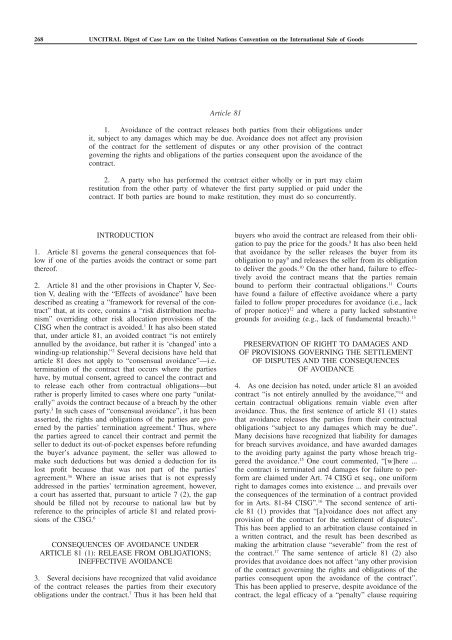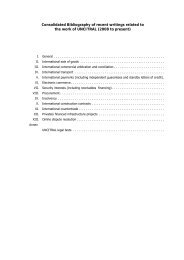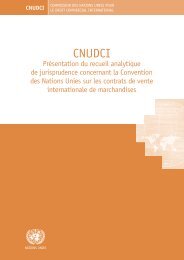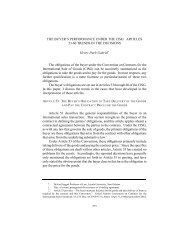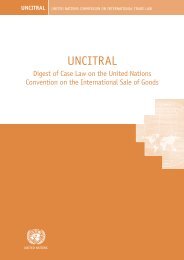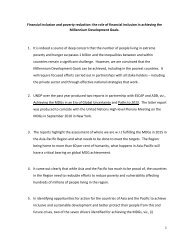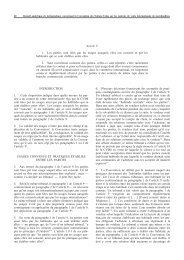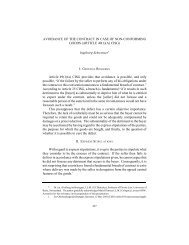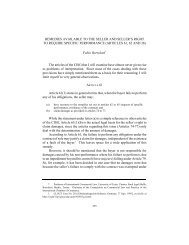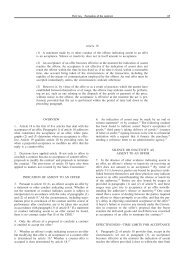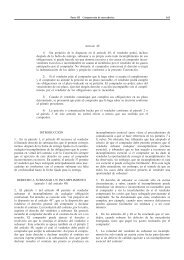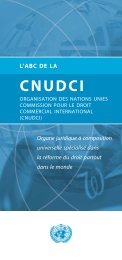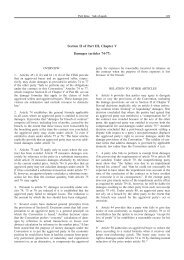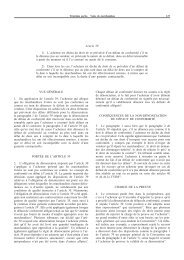Article 81 1. Avoidance of the contract releases both parties ... - uncitral
Article 81 1. Avoidance of the contract releases both parties ... - uncitral
Article 81 1. Avoidance of the contract releases both parties ... - uncitral
You also want an ePaper? Increase the reach of your titles
YUMPU automatically turns print PDFs into web optimized ePapers that Google loves.
268 UNCITRAL Digest <strong>of</strong> Case Law on <strong>the</strong> United Nations Convention on <strong>the</strong> International Sale <strong>of</strong> Goods<br />
<strong>Article</strong> <strong>81</strong><br />
<strong>1.</strong> <strong>Avoidance</strong> <strong>of</strong> <strong>the</strong> <strong>contract</strong> <strong>releases</strong> <strong>both</strong> <strong>parties</strong> from <strong>the</strong>ir obligations under<br />
it, subject to any damages which may be due. <strong>Avoidance</strong> does not affect any provision<br />
<strong>of</strong> <strong>the</strong> <strong>contract</strong> for <strong>the</strong> settlement <strong>of</strong> disputes or any o<strong>the</strong>r provision <strong>of</strong> <strong>the</strong> <strong>contract</strong><br />
governing <strong>the</strong> rights and obligations <strong>of</strong> <strong>the</strong> <strong>parties</strong> consequent upon <strong>the</strong> avoidance <strong>of</strong> <strong>the</strong><br />
<strong>contract</strong>.<br />
2. A party who has performed <strong>the</strong> <strong>contract</strong> ei<strong>the</strong>r wholly or in part may claim<br />
restitution from <strong>the</strong> o<strong>the</strong>r party <strong>of</strong> whatever <strong>the</strong> first party supplied or paid under <strong>the</strong><br />
<strong>contract</strong>. If <strong>both</strong> <strong>parties</strong> are bound to make restitution, <strong>the</strong>y must do so concurrently.<br />
INTRODUCTION<br />
<strong>1.</strong> <strong>Article</strong> <strong>81</strong> governs <strong>the</strong> general consequences that follow<br />
if one <strong>of</strong> <strong>the</strong> <strong>parties</strong> avoids <strong>the</strong> <strong>contract</strong> or some part<br />
<strong>the</strong>re<strong>of</strong>.<br />
2. <strong>Article</strong> <strong>81</strong> and <strong>the</strong> o<strong>the</strong>r provisions in Chapter V, Section<br />
V, dealing with <strong>the</strong> “Effects <strong>of</strong> avoidance” have been<br />
described as creating a “framework for reversal <strong>of</strong> <strong>the</strong> <strong>contract</strong>”<br />
that, at its core, contains a “risk distribution mechanism”<br />
overriding o<strong>the</strong>r risk allocation provisions <strong>of</strong> <strong>the</strong><br />
CISG when <strong>the</strong> <strong>contract</strong> is avoided. 1 It has also been stated<br />
that, under article <strong>81</strong>, an avoided <strong>contract</strong> “is not entirely<br />
annulled by <strong>the</strong> avoidance, but ra<strong>the</strong>r it is ‘changed’ into a<br />
winding-up relationship.” 2 Several decisions have held that<br />
article <strong>81</strong> does not apply to “consensual avoidance”—i.e.<br />
termination <strong>of</strong> <strong>the</strong> <strong>contract</strong> that occurs where <strong>the</strong> <strong>parties</strong><br />
have, by mutual consent, agreed to cancel <strong>the</strong> <strong>contract</strong> and<br />
to release each o<strong>the</strong>r from <strong>contract</strong>ual obligations—but<br />
ra<strong>the</strong>r is properly limited to cases where one party “unilaterally”<br />
avoids <strong>the</strong> <strong>contract</strong> because <strong>of</strong> a breach by <strong>the</strong> o<strong>the</strong>r<br />
party. 3 In such cases <strong>of</strong> “consensual avoidance”, it has been<br />
asserted, <strong>the</strong> rights and obligations <strong>of</strong> <strong>the</strong> <strong>parties</strong> are governed<br />
by <strong>the</strong> <strong>parties</strong>’ termination agreement. 4 Thus, where<br />
<strong>the</strong> <strong>parties</strong> agreed to cancel <strong>the</strong>ir <strong>contract</strong> and permit <strong>the</strong><br />
seller to deduct its out-<strong>of</strong>-pocket expenses before refunding<br />
<strong>the</strong> buyer’s advance payment, <strong>the</strong> seller was allowed to<br />
make such deductions but was denied a deduction for its<br />
lost pr<strong>of</strong>it because that was not part <strong>of</strong> <strong>the</strong> <strong>parties</strong>’<br />
agreement. ¦m Where an issue arises that is not expressly<br />
addressed in <strong>the</strong> <strong>parties</strong>’ termination agreement, however,<br />
a court has asserted that, pursuant to article 7 (2), <strong>the</strong> gap<br />
should be filled not by recourse to national law but by<br />
reference to <strong>the</strong> principles <strong>of</strong> article <strong>81</strong> and related provisions<br />
<strong>of</strong> <strong>the</strong> CISG. 6<br />
CONSEQUENCES OF AVOIDANCE UNDER<br />
ARTICLE <strong>81</strong> (1): RELEASE FROM OBLIGATIONS;<br />
INEFFECTIVE AVOIDANCE<br />
3. Several decisions have recognized that valid avoidance<br />
<strong>of</strong> <strong>the</strong> <strong>contract</strong> <strong>releases</strong> <strong>the</strong> <strong>parties</strong> from <strong>the</strong>ir executory<br />
obligations under <strong>the</strong> <strong>contract</strong>. 7 Thus it has been held that<br />
buyers who avoid <strong>the</strong> <strong>contract</strong> are released from <strong>the</strong>ir obligation<br />
to pay <strong>the</strong> price for <strong>the</strong> goods. 8 It has also been held<br />
that avoidance by <strong>the</strong> seller <strong>releases</strong> <strong>the</strong> buyer from its<br />
obligation to pay 9 and <strong>releases</strong> <strong>the</strong> seller from its obligation<br />
to deliver <strong>the</strong> goods. 10 On <strong>the</strong> o<strong>the</strong>r hand, failure to effectively<br />
avoid <strong>the</strong> <strong>contract</strong> means that <strong>the</strong> <strong>parties</strong> remain<br />
bound to perform <strong>the</strong>ir <strong>contract</strong>ual obligations. 11 Courts<br />
have found a failure <strong>of</strong> effective avoidance where a party<br />
failed to follow proper procedures for avoidance (i.e., lack<br />
<strong>of</strong> proper notice) 12 and where a party lacked substantive<br />
grounds for avoiding (e.g., lack <strong>of</strong> fundamental breach). 13<br />
PRESERVATION OF RIGHT TO DAMAGES AND<br />
OF PROVISIONS GOVERNING THE SETTLEMENT<br />
OF DISPUTES AND THE CONSEQUENCES<br />
OF AVOIDANCE<br />
4. As one decision has noted, under article <strong>81</strong> an avoided<br />
<strong>contract</strong> “is not entirely annulled by <strong>the</strong> avoidance,” 14 and<br />
certain <strong>contract</strong>ual obligations remain viable even after<br />
avoidance. Thus, <strong>the</strong> first sentence <strong>of</strong> article <strong>81</strong> (1) states<br />
that avoidance <strong>releases</strong> <strong>the</strong> <strong>parties</strong> from <strong>the</strong>ir <strong>contract</strong>ual<br />
obligations “subject to any damages which may be due”.<br />
Many decisions have recognized that liability for damages<br />
for breach survives avoidance, and have awarded damages<br />
to <strong>the</strong> avoiding party against <strong>the</strong> party whose breach triggered<br />
<strong>the</strong> avoidance. 15 One court commented, “[w]here ...<br />
<strong>the</strong> <strong>contract</strong> is terminated and damages for failure to perform<br />
are claimed under Art. 74 CISG et seq., one uniform<br />
right to damages comes into existence ... and prevails over<br />
<strong>the</strong> consequences <strong>of</strong> <strong>the</strong> termination <strong>of</strong> a <strong>contract</strong> provided<br />
for in Arts. <strong>81</strong>-84 CISG”. 16 The second sentence <strong>of</strong> article<br />
<strong>81</strong> (1) provides that “[a]voidance does not affect any<br />
provision <strong>of</strong> <strong>the</strong> <strong>contract</strong> for <strong>the</strong> settlement <strong>of</strong> disputes”.<br />
This has been applied to an arbitration clause contained in<br />
a written <strong>contract</strong>, and <strong>the</strong> result has been described as<br />
making <strong>the</strong> arbitration clause “severable” from <strong>the</strong> rest <strong>of</strong><br />
<strong>the</strong> <strong>contract</strong>. 17 The same sentence <strong>of</strong> article <strong>81</strong> (2) also<br />
provides that avoidance does not affect “any o<strong>the</strong>r provision<br />
<strong>of</strong> <strong>the</strong> <strong>contract</strong> governing <strong>the</strong> rights and obligations <strong>of</strong> <strong>the</strong><br />
<strong>parties</strong> consequent upon <strong>the</strong> avoidance <strong>of</strong> <strong>the</strong> <strong>contract</strong>”.<br />
This has been applied to preserve, despite avoidance <strong>of</strong> <strong>the</strong><br />
<strong>contract</strong>, <strong>the</strong> legal efficacy <strong>of</strong> a “penalty” clause requiring
Part three. Sale <strong>of</strong> goods 269<br />
payments from a seller who failed to deliver. 18 It has also<br />
been asserted that article <strong>81</strong> (1) preserves o<strong>the</strong>r <strong>contract</strong>ual<br />
provisions connected with <strong>the</strong> undoing <strong>of</strong> <strong>the</strong> <strong>contract</strong>, such<br />
as clauses requiring <strong>the</strong> return <strong>of</strong> delivered goods or o<strong>the</strong>r<br />
items received under <strong>the</strong> <strong>contract</strong>. 19<br />
reimbursement for an excess refund made after <strong>the</strong> <strong>contract</strong><br />
was cancelled. Instead, <strong>the</strong> court held, <strong>the</strong> seller’s claim<br />
was based on unjust enrichment principles and was governed<br />
by applicable national law.<br />
RESTITUTION UNDER ARTICLE <strong>81</strong> (2)<br />
5. For <strong>parties</strong> that have wholly or partially performed<br />
<strong>the</strong>ir <strong>contract</strong>ual obligations, <strong>the</strong> first sentence <strong>of</strong> article<br />
<strong>81</strong> (2) creates a right to claim restitution from <strong>the</strong> o<strong>the</strong>r<br />
side <strong>of</strong> whatever <strong>the</strong> party has “supplied or paid under <strong>the</strong><br />
<strong>contract</strong>”. It has been suggested that <strong>the</strong> restitutionary obligation<br />
imposed on a buyer by article <strong>81</strong> is not intended to<br />
put <strong>the</strong> seller into <strong>the</strong> position he would have been in had<br />
<strong>the</strong> <strong>contract</strong> been fully performed or had not been concluded,<br />
but instead requires <strong>the</strong> restitution <strong>of</strong> <strong>the</strong> actual<br />
goods delivered, even if those goods are damaged during<br />
that return. 20 O<strong>the</strong>r provisions <strong>of</strong> <strong>the</strong> Convention elaborate<br />
on <strong>the</strong> obligation to give restitution following avoidance <strong>of</strong><br />
<strong>the</strong> <strong>contract</strong>. Under article 82 <strong>of</strong> <strong>the</strong> Convention, a buyer’s<br />
inability to make restitution <strong>of</strong> delivered goods “substantially<br />
in <strong>the</strong> condition in which he received <strong>the</strong>m” will,<br />
subject to important exceptions, block <strong>the</strong> buyer’s right to<br />
avoid <strong>the</strong> <strong>contract</strong> (or to require <strong>the</strong> seller to deliver substitute<br />
goods). 21 Under article 84 (2), a buyer who must<br />
make restitution <strong>of</strong> goods to a seller must also “account to<br />
<strong>the</strong> seller” for all benefits it derived from <strong>the</strong> goods before<br />
making such restitution. 22 Similarly, a seller who must<br />
refund <strong>the</strong> price to <strong>the</strong> buyer must, under article 84 (1),<br />
pay interest on <strong>the</strong> funds until <strong>the</strong>y are restored, 23 although<br />
it has been held that a seller was not liable in damages for<br />
losses caused when it refused to give restitution <strong>of</strong> <strong>the</strong> price<br />
to <strong>the</strong> buyer. 24 It has been almost universally recognized<br />
that avoidance <strong>of</strong> <strong>the</strong> <strong>contract</strong> is a precondition for claiming<br />
restitution under article <strong>81</strong> (2). 25 One decision stated that<br />
a seller is obligated to repay <strong>the</strong> purchase price under article<br />
<strong>81</strong> (2) CISG only after an avoidance <strong>of</strong> <strong>the</strong> sales <strong>contract</strong><br />
by <strong>the</strong> buyer, and that avoidance is thus a constitutive<br />
right <strong>of</strong> <strong>the</strong> buyer which changes <strong>the</strong> <strong>contract</strong>ual relationship<br />
into a restitutionary relationship. 26<br />
6. In many cases where <strong>the</strong> buyer has properly avoided<br />
<strong>the</strong> <strong>contract</strong>, tribunals have awarded <strong>the</strong> aggrieved buyer<br />
restitution <strong>of</strong> <strong>the</strong> price (or part <strong>the</strong>re<strong>of</strong>) that it had paid to<br />
<strong>the</strong> seller. 27 A breaching seller is entitled to <strong>the</strong> restitution<br />
<strong>of</strong> <strong>the</strong> goods it delivered to a buyer who <strong>the</strong>reafter avoided<br />
<strong>the</strong> <strong>contract</strong>, 28 and it has been held that an avoiding buyer<br />
has a right, under article <strong>81</strong> (2), to force <strong>the</strong> seller to take<br />
back goods it delivered. 29 A seller who properly avoided<br />
<strong>the</strong> <strong>contract</strong> has also been awarded restitution <strong>of</strong> <strong>the</strong> goods<br />
it delivered, 30 and it has been recognized that breaching<br />
buyers are entitled to restitution <strong>of</strong> <strong>the</strong> portion <strong>of</strong> <strong>the</strong> price<br />
actually paid if <strong>the</strong> seller subsequently avoids. 31 It has been<br />
held, however, that not all restitution claims arising out <strong>of</strong><br />
a terminated sales <strong>contract</strong> are governed by <strong>the</strong> CISG. In<br />
one decision 32 <strong>the</strong> <strong>parties</strong> had mutually agreed to cancel<br />
<strong>the</strong>ir <strong>contract</strong> and <strong>the</strong> seller had given <strong>the</strong> buyer a refund<br />
for a payment check that was later dishonoured. When <strong>the</strong><br />
seller sued to recover <strong>the</strong> refund, <strong>the</strong> court found that <strong>the</strong><br />
seller’s claim was not governed by article <strong>81</strong> (2) because<br />
that provision deals only with what a party has “supplied<br />
or paid under <strong>the</strong> <strong>contract</strong>”, whereas <strong>the</strong> seller was seeking<br />
PLACE OF RESTITUTION; JURISDICTION OVER<br />
ACTIONS FOR RESTITUTION; RISK OF LOSS<br />
FOR GOODS BEING RETURNED; CURRENCY<br />
FOR RESTITUTION OF PAYMENTS<br />
7. Several decisions address <strong>the</strong> problem <strong>of</strong> where <strong>the</strong><br />
obligation to make restitution under article <strong>81</strong> (2) should<br />
be performed. This question has arisen ei<strong>the</strong>r as a direct<br />
issue, or as a subsidiary matter related to a court’s jurisdiction<br />
or to <strong>the</strong> question <strong>of</strong> who bears risk <strong>of</strong> loss for goods<br />
that are in <strong>the</strong> process <strong>of</strong> being returned by <strong>the</strong> buyer. Thus,<br />
in determining whe<strong>the</strong>r an avoiding buyer <strong>of</strong>fered <strong>the</strong><br />
breaching seller restitution <strong>of</strong> delivered goods at <strong>the</strong> proper<br />
location, a court has held that <strong>the</strong> issue <strong>of</strong> <strong>the</strong> place for<br />
restitution is not expressly settled in <strong>the</strong> CISG, nor can <strong>the</strong><br />
CISG provision dealing with <strong>the</strong> place for seller’s delivery<br />
(article 31) be applied by analogy, so that <strong>the</strong> matter must<br />
be resolved by reference to national law—specifically (in<br />
this case), <strong>the</strong> law governing <strong>the</strong> enforcement <strong>of</strong> a judgement<br />
ordering such restitution. 33 Employing somewhat<br />
similar reasoning for purposes <strong>of</strong> determining its jurisdiction<br />
under article 5 (1) <strong>of</strong> <strong>the</strong> 1968 Brussels Convention<br />
on Jurisdiction, a court has held that <strong>the</strong> CISG does not<br />
expressly settle where a seller must make restitution <strong>of</strong> <strong>the</strong><br />
price under article <strong>81</strong> (2), that <strong>the</strong> CISG provision governing<br />
<strong>the</strong> place for buyer’s payment <strong>of</strong> <strong>the</strong> price (article<br />
57 (1)) did not contain a general principle <strong>of</strong> <strong>the</strong><br />
Convention that can be used to resolve <strong>the</strong> issue, and thus<br />
that <strong>the</strong> matter must be referred to applicable national law. 34<br />
In contrast to <strong>the</strong> reasoning <strong>of</strong> <strong>the</strong> foregoing decisions, which<br />
led to <strong>the</strong> application <strong>of</strong> national law to <strong>the</strong> issue <strong>of</strong> <strong>the</strong> place<br />
for restitution, ano<strong>the</strong>r decision asserted that jurisdiction<br />
under article 5 (1) <strong>of</strong> <strong>the</strong> Brussels Convention over a buyer’s<br />
claim for restitution <strong>of</strong> <strong>the</strong> price should be determined by<br />
reference to <strong>the</strong> place <strong>of</strong> <strong>the</strong> delivery obligation under article<br />
31 <strong>of</strong> <strong>the</strong> CISG. 35 Ano<strong>the</strong>r court has found that <strong>the</strong> CISG<br />
does not expressly deal with <strong>the</strong> question <strong>of</strong> where, for purposes<br />
<strong>of</strong> determining who bore risk <strong>of</strong> loss, an avoiding<br />
buyer makes restitution <strong>of</strong> goods that are returned via third<br />
party carrier, but it resolved <strong>the</strong> issue by reference to <strong>the</strong><br />
CISG itself without recourse to national law: it filled <strong>the</strong><br />
“gap” pursuant to article 7 (2) by identifying a general principle<br />
that <strong>the</strong> place for performing restitutionary obligations<br />
should mirror <strong>the</strong> place for performing <strong>the</strong> primary <strong>contract</strong>ual<br />
obligations; it found that buyer made its delivery (and<br />
thus risk <strong>of</strong> loss transferred to <strong>the</strong> seller) when it handed <strong>the</strong><br />
goods over to <strong>the</strong> carrier for return shipment, because under<br />
<strong>the</strong> <strong>contract</strong> risk had passed to buyer in <strong>the</strong> original delivery<br />
when <strong>the</strong> manufacturer handed <strong>the</strong> goods over to <strong>the</strong> carrier. 36<br />
The court also found this result consistent with <strong>the</strong> principles<br />
<strong>of</strong> article 82, which creates very broad exceptions to an<br />
avoiding buyer’s obligation to return goods in <strong>the</strong>ir original<br />
condition and <strong>the</strong>reby suggests that <strong>the</strong> seller generally bears<br />
<strong>the</strong> risk that <strong>the</strong> condition <strong>of</strong> <strong>the</strong> goods will deteriorate.<br />
Finally, it has been concluded that an avoiding buyer’s refund<br />
<strong>of</strong> <strong>the</strong> price was due in <strong>the</strong> same currency in which <strong>the</strong> price<br />
had been duly paid, and at <strong>the</strong> exchange rate specified in<br />
<strong>the</strong> <strong>contract</strong> for payment <strong>of</strong> <strong>the</strong> price to <strong>the</strong> seller. 37
270 UNCITRAL Digest <strong>of</strong> Case Law on <strong>the</strong> United Nations Convention on <strong>the</strong> International Sale <strong>of</strong> Goods<br />
REQUIREMENT THAT MUTUAL RESTITUTION<br />
BE CONCURRENT<br />
8. The second sentence <strong>of</strong> article <strong>81</strong> (2) specifies that,<br />
where <strong>both</strong> <strong>parties</strong> are required under <strong>the</strong> first sentence <strong>of</strong><br />
<strong>the</strong> provision to make restitution (i.e. where <strong>both</strong> <strong>parties</strong><br />
have “supplied or paid” something under an avoided <strong>contract</strong>),<br />
<strong>the</strong>n mutual restitution is to be made “concurrently”.<br />
An arbitration panel has ordered an avoiding buyer and <strong>the</strong><br />
breaching seller to make simultaneous restitution <strong>of</strong> <strong>the</strong><br />
goods and <strong>the</strong> price. 38 Consistently with <strong>the</strong> principle <strong>of</strong><br />
mutual restitution, a court has ruled that a breaching seller<br />
was not in default <strong>of</strong> its obligation to give <strong>the</strong> avoiding<br />
buyer restitution <strong>of</strong> <strong>the</strong> price until <strong>the</strong> buyer actually <strong>of</strong>fered<br />
to return <strong>the</strong> goods that seller had delivered, and it ordered<br />
<strong>the</strong> <strong>parties</strong> to make concurrent restitution. 39 Ano<strong>the</strong>r decision<br />
stated that an avoiding seller need not make restitution<br />
<strong>of</strong> <strong>the</strong> buyer’s payments until delivered goods were<br />
returned. 40<br />
INTERACTION BETWEEN RIGHT TO RESTITUTION<br />
UNDER ARTICLE <strong>81</strong> (2) AND RIGHTS<br />
UNDER NATIONAL LAW<br />
9. An avoiding seller’s right to restitution <strong>of</strong> delivered<br />
goods under article <strong>81</strong> (2) can come into conflict with <strong>the</strong><br />
rights <strong>of</strong> third <strong>parties</strong> (e.g. <strong>the</strong> buyer’s o<strong>the</strong>r creditors) in<br />
<strong>the</strong> goods. Such conflicts are particularly acute where <strong>the</strong><br />
buyer has become insolvent, so that recovery <strong>of</strong> <strong>the</strong> goods<br />
<strong>the</strong>mselves is more attractive than a monetary remedy (such<br />
as a right to collect <strong>the</strong> price or damages) against <strong>the</strong> buyer.<br />
Several decisions have dealt with this conflict. In one, a<br />
court found that an avoiding seller’s restitutionary rights<br />
under article <strong>81</strong>(2) were trumped by <strong>the</strong> rights <strong>of</strong> one <strong>of</strong><br />
<strong>the</strong> buyer’s creditors that had obtained and perfected, under<br />
national law, a security interest in <strong>the</strong> delivered goods: <strong>the</strong><br />
court ruled that <strong>the</strong> question <strong>of</strong> who had priority rights in<br />
<strong>the</strong> goods as between <strong>the</strong> seller and <strong>the</strong> third party creditor<br />
was, under CISG article 4, beyond <strong>the</strong> scope <strong>of</strong> <strong>the</strong> Convention<br />
and was governed instead by applicable national<br />
law, under which <strong>the</strong> third party creditor prevailed. 41 This<br />
was <strong>the</strong> result even though <strong>the</strong> sales <strong>contract</strong> included a<br />
clause reserving title to <strong>the</strong> goods in <strong>the</strong> seller until <strong>the</strong><br />
buyer had completed payment (which buyer had not done):<br />
<strong>the</strong> court ruled that <strong>the</strong> effect <strong>of</strong> that clause with respect<br />
to a non-party to <strong>the</strong> sales <strong>contract</strong> was also governed by<br />
national law ra<strong>the</strong>r than <strong>the</strong> CISG, and under <strong>the</strong> applicable<br />
law <strong>the</strong> third party’s claim to <strong>the</strong> goods had priority over<br />
seller’s. Ano<strong>the</strong>r court, in contrast, found that an avoiding<br />
seller could recover goods from a buyer that had gone<br />
through insolvency proceedings after <strong>the</strong> goods were delivered.<br />
42 In this case, however, <strong>the</strong> seller had a retention <strong>of</strong><br />
title clause that was valid under applicable national law<br />
and that had survived <strong>the</strong> buyer’s now-completed insolvency<br />
proceedings, and <strong>the</strong>re apparently was no third party<br />
with a claim to <strong>the</strong> goods that was superior to <strong>the</strong> seller’s<br />
under national law. Thus <strong>the</strong> two cases described in this<br />
discussion do not appear to be inconsistent. Indeed, <strong>the</strong><br />
later case cited <strong>the</strong> earlier case in support <strong>of</strong> its analysis.<br />
Notes<br />
1<br />
CLOUT case No. 422 [Oberster Gerichtsh<strong>of</strong>, Austria, 29 June 1999], Unilex.<br />
2<br />
Id.; see also Landgericht Düsseldorf, Germany, 11 October 1995, Unilex (stating that avoidance “changes <strong>the</strong> <strong>contract</strong>ual relationship<br />
into a restitutional relationship [winding up]”).<br />
3<br />
Tribunal <strong>of</strong> International Commercial Arbitration at <strong>the</strong> Russian Federation Chamber <strong>of</strong> Commerce and Industry, Russia, award in<br />
case No. 82/1996 <strong>of</strong> 3 March 1997, Unilex; Oberster Gerichtsh<strong>of</strong>, Austria, 29 June 1999, Unilex. Compare CLOUT case No. 288<br />
[Oberlandesgericht München, Germany, 28 January 1998] (where seller “refunded” buyer <strong>the</strong> purchase price <strong>of</strong> goods even though buyer’s<br />
check for payment <strong>of</strong> <strong>the</strong> price had been dishonoured, seller’s claim for restitution <strong>of</strong> <strong>the</strong> refund was not governed by article <strong>81</strong> (1)<br />
because article <strong>81</strong> (1) is limited to restitution <strong>of</strong> what is supplied or paid under <strong>the</strong> <strong>contract</strong>; seller’s “refund” had not been made under<br />
<strong>the</strong> <strong>contract</strong>); but see CLOUT case No. 136 [Oberlandesgericht Celle, Germany, 24 May 1995], where <strong>the</strong> tribunal appears to apply<br />
article <strong>81</strong> (2) even though <strong>the</strong> <strong>parties</strong> terminated <strong>the</strong> <strong>contract</strong> by mutual consent. See also <strong>the</strong> discussion <strong>of</strong> <strong>the</strong> application <strong>of</strong> article <strong>81</strong><br />
to fill gaps in <strong>the</strong> <strong>parties</strong>’ termination agreement in CLOUT case No. 422 [Oberster Gerichtsh<strong>of</strong>, Austria, 29 June 1999], Unilex.<br />
4<br />
Tribunal <strong>of</strong> International Commercial Arbitration at <strong>the</strong> Russian Federation Chamber <strong>of</strong> Commerce and Industry, Russia, award in<br />
case No. 82/1996 <strong>of</strong> 3 March 1997, Unilex; CLOUT case No. 422 [Oberster Gerichtsh<strong>of</strong>, Austria, 29 June 1999], Unilex.<br />
5<br />
Tribunal <strong>of</strong> International Commercial Arbitration at <strong>the</strong> Federation Chamber <strong>of</strong> Commerce and Industry, case No. 82/1996, Russia,<br />
3 March 1997, Unilex.<br />
6<br />
CLOUT case No. 422 [Oberster Gerichtsh<strong>of</strong>, Austria, 29 June 1999], Unilex.<br />
7<br />
For general statements regarding <strong>the</strong> <strong>parties</strong>’ release from <strong>the</strong>ir obligations upon avoidance see, e.g. CLOUT case No. 422 [Oberster<br />
Gerichtsh<strong>of</strong>, Austria, 29 June 1999], Unilex; CLOUT case No. 2 [Oberlandesgericht Frankfurt am Main, Germany, 17 September 1991]<br />
(see full text <strong>of</strong> <strong>the</strong> decision); CLOUT case No. 261 [Berzirksgericht der Sanne, Switzerland, 20 February 1997]; ICC Court <strong>of</strong> Arbitration,<br />
award No. 9887, August 1999, Unilex.<br />
8<br />
CLOUT case No. 235 [Bundesgerichtsh<strong>of</strong>, Germany, 25 June 1997] (partial avoidance); CLOUT case No. 348 [Schweizerisches<br />
Bundesgericht, Switzerland, 28 October 1998]; CLOUT case No. 2 [Oberlandesgericht Frankfurt am Main, Germany, 17 September<br />
1991] (see full text <strong>of</strong> <strong>the</strong> decision); ICC Court <strong>of</strong> Arbitration, award No. 7645, March 1995, Unilex. See also Landgericht Krefeld,<br />
Germany, 24 November 1992, English abstract available in <strong>the</strong> Unilex database (implying that in a partial avoidance situation <strong>the</strong> buyer<br />
was released from its obligation to pay for <strong>the</strong> portion <strong>of</strong> <strong>the</strong> goods subject to avoidance); CLOUT case No. 214 [Handelsgericht des<br />
Kantons Zürich, Switzerland, 5 February 1997] (in a partial performance situation, court appears to presume that buyer’s avoidance<br />
released <strong>both</strong> <strong>parties</strong> from remaining executory duties).<br />
9<br />
ICC Court <strong>of</strong> Arbitration, award No. 9887, August 1999, Unilex.
Part three. Sale <strong>of</strong> goods 271<br />
10<br />
CLOUT case No. 261 [Berzirksgericht der Sanne, Switzerland, 20 February 1997]. See also arbitral award No. ZHK 273/95, Zürich<br />
Chamber <strong>of</strong> Commerce Arbitration Proceedings, Switzerland, 31 May 1996, Unilex, where <strong>the</strong> tribunal indicates that <strong>the</strong> buyer’s action<br />
for damages based on avoidance was an alternative to an action to require seller to deliver.<br />
11<br />
In <strong>the</strong> following cases, <strong>the</strong> tribunal indicated that <strong>the</strong> buyer was not released from its obligation to pay because it had failed to avoid<br />
<strong>the</strong> <strong>contract</strong>: CLOUT case No. 284 [Oberlandesgericht Köln, Germany, 21 August 1997]; Landgericht München, Germany, 20 March<br />
1995, Unilex; CLOUT case No. 229 [Bundesgerichtsh<strong>of</strong>, Germany, 4 December 1996]; CLOUT case No. 79 [Oberlandesgericht Frankfurt<br />
am Main, Germany, 18 January 1994]. See also CLOUT case No. <strong>81</strong> [Oberlandesgericht Düsseldorf, Germany, 10 February 1994]<br />
(implying that, because buyer did not validly avoid <strong>the</strong> <strong>contract</strong> it was not released from its obligation to pay) and CLOUT case No. 83<br />
[Oberlandesgericht München, Germany, 2 March 1994] (same). It has also been found that a seller who fails to validly avoid <strong>the</strong> contact<br />
is not released from its obligation to deliver <strong>the</strong> goods. Arbitral award No. ZHK 273/95, Zürich Chamber <strong>of</strong> Commerce Arbitration<br />
Proceedings, Switzerland, 31 May 1996, Unilex.<br />
12<br />
CLOUT case No. 229 [Bundesgerichtsh<strong>of</strong>, Germany, 4 December 1996] (buyer did not have right to avoid because its notice <strong>of</strong> lack<br />
<strong>of</strong> conformity was not sufficiently specific to satisfy article 39); Landgericht München, Germany, 20 March 1995, Unilex (buyer lost<br />
right to avoid because it did give sufficient notice <strong>of</strong> lack <strong>of</strong> conformity under article 39 and its notice <strong>of</strong> avoidance was untimely under<br />
article 49(2)); CLOUT case No. <strong>81</strong> [Oberlandesgericht Düsseldorf, Germany, 10 February 1994] (buyer lacked right to avoid because<br />
its notice <strong>of</strong> lack <strong>of</strong> conformity was not timely under article 39) (see full text <strong>of</strong> <strong>the</strong> decision); CLOUT case No. 83 [Oberlandesgericht<br />
München, Germany, 2 March 1994] (buyer did not have right to avoid because its declaration <strong>of</strong> avoidance was untimely under article<br />
49 (2)); ICC Court <strong>of</strong> Arbitration Case No. 9887, August 1999, Unilex (seller’s delivery <strong>of</strong> non-conforming goods did not release<br />
buyer from its obligation to pay because buyer did not give notice declaring <strong>the</strong> <strong>contract</strong> avoided as required by article 49 (2) (b) (i)<br />
(although seller’s subsequent avoidance released <strong>both</strong> <strong>parties</strong> from <strong>the</strong>ir obligations)).<br />
13<br />
CLOUT case No. 284 [Oberlandesgericht Köln, Germany, 21 August 1997] (buyer lacked right to avoid because it ei<strong>the</strong>r failed to<br />
prove or had waived its right to complain <strong>of</strong> lack <strong>of</strong> conformity); CLOUT case No. 79 [Oberlandesgericht Frankfurt am Main, Germany,<br />
18 January 1994], (buyer did not have right to avoid for late delivery because it did not fix an additional period <strong>of</strong> time for seller to<br />
perform under articles 47 and 49 (1) (b), and buyer lacked right to avoid for lack <strong>of</strong> conformity because it failed to prove that <strong>the</strong> defects<br />
constituted a fundamental breach) (see full text <strong>of</strong> <strong>the</strong> decision); CLOUT case No. 83 [Oberlandesgericht München, Germany, 2 March<br />
1994] (buyer had no right to avoid because <strong>the</strong> inferior quality <strong>of</strong> <strong>the</strong> goods did not constitute a fundamental breach); arbitral award<br />
No. ZHK 273/95, Zürich Chamber <strong>of</strong> Commerce Arbitration Proceedings, Switzerland, 31 May 1996, Unilex (seller lacked right to avoid<br />
because buyer’s failure to make one instalment payment did not constitute a fundamental breach <strong>of</strong> <strong>the</strong> <strong>contract</strong>, buyer had not committed<br />
an anticipatory repudiation <strong>of</strong> <strong>the</strong> <strong>contract</strong>, and seller had not fixed an additional deadline period under article 64 for buyer to pay);<br />
ICC Court <strong>of</strong> Arbitration, award No. 9887, August 1999, Unilex (seller’s late delivery did not release buyer from its obligation to pay<br />
because buyer did not grant seller additional time for performance under article 47 (1) (although seller’s subsequent avoidance released<br />
<strong>both</strong> <strong>parties</strong> from <strong>the</strong>ir obligations)).<br />
14<br />
CLOUT case No. 422 [Oberster Gerichtsh<strong>of</strong>, Austria, 29 June 1999], Unilex; see also Landgericht Düsseldorf, Germany, 11 October<br />
1995, Unilex (stating that avoidance “changes <strong>the</strong> <strong>contract</strong>ual relationship into a restitutional relationship [winding up]”).<br />
15<br />
CLOUT case No. 253 [Cantone del Ticino Tribunale d’appello, Switzerland, 15 January 1998] (see full text <strong>of</strong> <strong>the</strong> decision); CLOUT<br />
case No. 345 [Landgericht Heilbronn, Germany, 15 September 1997]; CLOUT case No. 214 [Handelsgericht des Kantons Zürich, Switzerland,<br />
5 February 1997]; CLOUT case No. 348 [Oberlandesgericht Hamburg, Germany, 26 November 1999]; CLOUT case No. 422<br />
[Oberster Gerichtsh<strong>of</strong>, Austria, 29 June 1999], Unilex; arbitral award No. ZHK 273/95, Zürich Chamber <strong>of</strong> Commerce Arbitration Proceedings,<br />
Switzerland, 31 May 1996, Unilex; CLOUT case No. 166 [Arbitration-Schiedsgericht der Handelskammer Hamburg, 21 March,<br />
21 June 1996] (see full text <strong>of</strong> <strong>the</strong> decision).<br />
16<br />
CLOUT case No. 166 [Arbitration-Schiedsgericht der Handelskammer Hamburg, 21 March, 21 June 1996] (see full text <strong>of</strong> <strong>the</strong><br />
decision).<br />
17<br />
CLOUT case No. 23 [Federal District Court, Sou<strong>the</strong>rn District <strong>of</strong> New York, United States, 14 April 1992] (see full text <strong>of</strong> <strong>the</strong><br />
decision).<br />
18<br />
ICC Court <strong>of</strong> Arbitration, award No. 9978, March 1999, Unilex.<br />
19<br />
CLOUT case No. 422 [Oberster Gerichtsh<strong>of</strong>, Austria, 29 June 1999], Unilex.<br />
20<br />
Id.<br />
21<br />
See <strong>the</strong> Digest for article 82.<br />
22<br />
See <strong>the</strong> Digest for article 84, paras 5-6.<br />
23<br />
See <strong>the</strong> Digest article 84, paras 2-4.<br />
24<br />
ICC Court <strong>of</strong> Arbitration, award No. 9978, March 1999, Unilex; but see Landgericht Landshut, Germany, 5 April 1995, Unilex, in<br />
which <strong>the</strong> court apparently held a breaching seller liable for failing to make restitution to a buyer that had properly avoided <strong>the</strong> <strong>contract</strong><br />
(although <strong>the</strong> remedy granted for this liability, if any, is unclear).<br />
25<br />
CLOUT case No. 293 [Arbitration-Schiedsgericht der Hamburger freundschatlichen Arbitrage, 29 December 1998] (“The claimant’s<br />
claim as buyer under Art. <strong>81</strong> (2) first sentence CISG for reimbursement <strong>of</strong> <strong>the</strong> prepayment first requires <strong>contract</strong> avoidance (article <strong>81</strong> (1)<br />
first sentence CISG)”) (see full text <strong>of</strong> <strong>the</strong> decision); CLOUT case No. 214 [Handelsgericht des Kantons Zürich, Switzerland, 5 February<br />
1997] (see full text <strong>of</strong> <strong>the</strong> decision); Landgericht Düsseldorf, Germany, 11 October 1995, Unilex (denying buyer restitution because it<br />
had not properly avoided <strong>the</strong> <strong>contract</strong>); CLOUT case No. 345 [Landgericht Heilbronn, Germany, 15 September 1997]; Tribunal <strong>of</strong> International<br />
Commercial Arbitration at <strong>the</strong> Russian Federation Chamber <strong>of</strong> Commerce and Industry, Russia, award in case No. 1/1993 <strong>of</strong><br />
15 April 1994, Unilex; Landgericht Krefeld, Germany, 24 November 1992, Unilex; but see Compromex arbitration, Mexico, 4 May 1993,<br />
Unilex (invoking article <strong>81</strong> (2) to justify <strong>the</strong> seller’s claim for <strong>the</strong> price <strong>of</strong> delivered goods where it does not appear <strong>the</strong> <strong>contract</strong> was<br />
avoided).<br />
26<br />
Landgericht Düsseldorf, Germany, 11 October 1995, Unilex.
272 UNCITRAL Digest <strong>of</strong> Case Law on <strong>the</strong> United Nations Convention on <strong>the</strong> International Sale <strong>of</strong> Goods<br />
27<br />
Tribunal <strong>of</strong> International Commercial Arbitration at <strong>the</strong> Russian Federation Chamber <strong>of</strong> Commerce and Industry, Russia, award in<br />
case No. 1/1993 <strong>of</strong> 15 April 1994, Unilex; CLOUT case No. 302 [Arbitration-International Chamber <strong>of</strong> Commerce no. 7660, 1994] (see<br />
full text <strong>of</strong> <strong>the</strong> decision); CLOUT case No. 312 [Cour d’appel Paris, France, 14 January 1998] (see full text <strong>of</strong> <strong>the</strong> decision); China<br />
International Economic and Trade Arbitration Commission (CIETAC), People’s Republic <strong>of</strong> China, 30 October 1991, Unilex, also available<br />
on <strong>the</strong> INTERNET at http://www.cisg.law.pace.edu/cisg/wais/db/cases2/911030c<strong>1.</strong>html; CLOUT case No. 345 [Landgericht Heilbronn,<br />
Germany, 15 September 1997]; CLOUT case No. 253 [Cantone del Ticino Tribunale d’appello, Switzerland, 15 January 1998]<br />
(see full text <strong>of</strong> <strong>the</strong> decision); CLOUT case No. 214 [Handelsgericht des Kantons Zürich, Switzerland, 5 February 1997]; CLOUT case<br />
No. 103 [Arbitration-International Chamber <strong>of</strong> Commerce no. 6653 1993] (without citing art. <strong>81</strong>); CLOUT case No. 136 [Oberlandesgericht<br />
Celle, Germany, 24 May 1995]; Cour d’appel Aix-en-Provence, France, 21 November 1996, Unilex (affirmed in CLOUT case<br />
No. 315 [Cour de Cassation, France, 26 May 1999]; Landgericht Düsseldorf, Germany, 11 October 1995, Unilex; Käräjäoikeus Kuopio,<br />
Finland, 5 November 1996, available on <strong>the</strong> Internet at http://www.utu.fi/oik/tdk/xcisg/tap6.html; ICC Court <strong>of</strong> Arbitration, award No. 9978,<br />
March 1999, Unilex; CLOUT case No. 293 [Arbitration-Schiedsgericht der Hamburger freundschatlichen Arbitrage, 29 December 1998]<br />
(awarding restitution <strong>of</strong> <strong>the</strong> buyer’s prepayment for a delivery because “[t]he rendered prepayment is, in <strong>the</strong> meaning <strong>of</strong> art. <strong>81</strong> (2) first<br />
sentence CISG, performance <strong>of</strong> <strong>the</strong> <strong>contract</strong> on <strong>the</strong> part <strong>of</strong> <strong>the</strong> claimant as buyer”) (see full text <strong>of</strong> <strong>the</strong> decision).<br />
28<br />
See Landgericht Landshut, Germany, 5 April 1995, Unilex (ordering a breaching seller to make restitution <strong>of</strong> price to <strong>the</strong> avoiding<br />
buyer concurrently with buyer making restitution <strong>of</strong> goods to seller); China International Economic and Trade Arbitration Commission<br />
(CIETAC), People’s Republic <strong>of</strong> China, 30 October 1991, Unilex; CLOUT case No. 165 [Oberlandesgericht Oldenburg, Germany,<br />
1 February 1995] (stating that buyer who avoided <strong>contract</strong> for <strong>the</strong> purchase <strong>of</strong> furniture must make restitution <strong>of</strong> defective furniture it<br />
received under <strong>the</strong> <strong>contract</strong>) (citing article 84) (see full text <strong>of</strong> <strong>the</strong> decision). See also article 82 (stripping a buyer <strong>of</strong> <strong>the</strong> right to avoid<br />
<strong>the</strong> <strong>contract</strong> if it cannot make restitution <strong>of</strong> <strong>the</strong> goods substantially in <strong>the</strong> condition in which it received <strong>the</strong>m, unless one <strong>of</strong> <strong>the</strong> exceptions<br />
in article 82 (2) applies).<br />
29<br />
Landgericht Krefeld, Germany, 24 November 1992, Unilex.<br />
30<br />
CLOUT case No. 308 [Federal Court <strong>of</strong> Australia, 28 April 1995] (see full text <strong>of</strong> <strong>the</strong> decision).<br />
31<br />
CLOUT case No. 261 [Berzirksgericht der Sanne, Switzerland, 20 February 1997]; CLOUT case No. 308 [Federal Court <strong>of</strong> Australia,<br />
28 April 1995] (see full text <strong>of</strong> <strong>the</strong> decision).<br />
32<br />
CLOUT case No. 288 [Oberlandesgericht München, Germany, 28 January 1998].<br />
33<br />
Landgericht Landshut, Germany, 5 April 1995, Unilex.<br />
34<br />
CLOUT case No. 312 [Cour d’appel Paris, France, 14 January 1998].<br />
35<br />
CLOUT case No. 295 [Oberlandesgericht Hamm, Germany, 5 November 1997] (see full text <strong>of</strong> <strong>the</strong> decision).<br />
36<br />
CLOUT case No. 422 [Oberster Gerichtsh<strong>of</strong>, Austria, 29 June 1999], Unilex.<br />
37<br />
CLOUT case No. 302 [Arbitration-International Chamber <strong>of</strong> Commerce no. 7660, 1994].<br />
38<br />
China International Economic and Trade Arbitration Commission (CIETAC), People’s Republic <strong>of</strong> China, 30 October 1991, Unilex<br />
(ordering avoiding buyer to return goods and breaching seller to return price); see also Cour d’appel Aix-en-Provence, France, 21 November<br />
1996, Unilex (“<strong>the</strong> avoidance <strong>of</strong> <strong>the</strong> sale has, as a consequence, <strong>the</strong> restitution <strong>of</strong> <strong>the</strong> goods against restitution <strong>of</strong> <strong>the</strong> price”).<br />
39<br />
Landgericht Landshut, Germany, 5 April 1995, Unilex.<br />
40<br />
CLOUT case No. 308 [Federal Court <strong>of</strong> Australia, 28 April 1995] (see full text <strong>of</strong> <strong>the</strong> decision).<br />
41<br />
CLOUT case No. 613 [Federal] Court <strong>of</strong> Appeals for <strong>the</strong> Nor<strong>the</strong>rn District <strong>of</strong> Illinois, United States, 28 March 2002] (Usinor Industeel<br />
v. Leeco Steel Products, Inc.).<br />
42<br />
CLOUT case No. 308 [Federal Court <strong>of</strong> Australia, 28 April 1995] (see full text <strong>of</strong> <strong>the</strong> decision).


